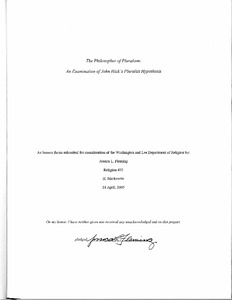| dc.rights.license | In Copyright | en_US |
| dc.creator | Fleming, Jessica Lynne | |
| dc.date.accessioned | 2023-10-20T17:40:49Z | |
| dc.date.available | 2023-10-20T17:40:49Z | |
| dc.date.created | 2005 | |
| dc.identifier | WLURG038_Fleming_thesis_2005 | |
| dc.identifier.uri | https://dspace.wlu.edu/handle/11021/36403 | |
| dc.description.abstract | An innovative philosopher of religion and renowned theologian, John Hick is deeply concerned with the manifold issues surrounding the modern inter-religious dialogue. Recognizing
both the validity of human thought and experience and the spiritual depth available through diverse religious traditions, his work has been hugely significant in the establishment and
recognition of a pluralist hypothesis. In an effort to make his modern pluralist interpretation of religion readily accessible to an increasingly scientific public, he writes extensively on the value
of inter-faith discussions and understanding. Evolving from his initial Christocentric dialogical style into an enlightened advocate of religious pluralism and discursive diversity over the
decades, Hick champions a ubiquitous form of spirituality manifest through limitless variety of humanly-conceived forms: its application toward a unifying religious experience has immense
and exciting possibility in contemporary application. Therefore, it is important for any serious scholar of Hick to understand fully his intellectual development, from his ministerial training and initial Christian inclusivism, to the present, less polarizing, dialogical form of pluralism arrived at through the subjectivity of Kantian epistemology. What were his most controversial statements and how has he sought to resolve them through his present philosophy? How far has he really moved from this initial viewpoint and does he retain validity as a serious scholar? Through thoughtful attention to the phenomenological, epistemological, and criteriological forces which have impacted his thought, one can more fully appreciate the dialogical breadth of pluralism in its present form. Indeed, as Hick actively incorporates material and ideology from a multiplicity of traditions, he reconciles questions of universality versus particularity in a volatile and changing international landscape in an effort to realize an equitable and dialogic goal for all of mankind. | en_US |
| dc.format.extent | 64 pages | en_US |
| dc.language.iso | en_US | en_US |
| dc.rights | This material is made available for use in research, teaching, and private study, pursuant to U.S. Copyright law. The user assumes full responsibility for any use of the materials, including but not limited to, infringement of copyright and publication rights of reproduced materials. Any materials used should be fully credited with the source. | en_US |
| dc.rights.uri | http://rightsstatements.org/vocab/InC/1.0/ | en_US |
| dc.subject.other | Washington and Lee University -- Honors in Religion | en_US |
| dc.title | The Philosopher of Pluralism: An Examination of John Hick's Pluralist Hypothesis | en_US |
| dc.type | Text | en_US |
| dcterms.isPartOf | WLURG038 - Student Papers | en_US |
| dc.rights.holder | Fleming, Jessica Lynne | en_US |
| dc.subject.fast | Hick, John, 1922-2012 | en_US |
| dc.subject.fast | Religious pluralism -- Christianity | en_US |
| dc.subject.fast | Christianity | en_US |
| local.department | Religion | en_US |
